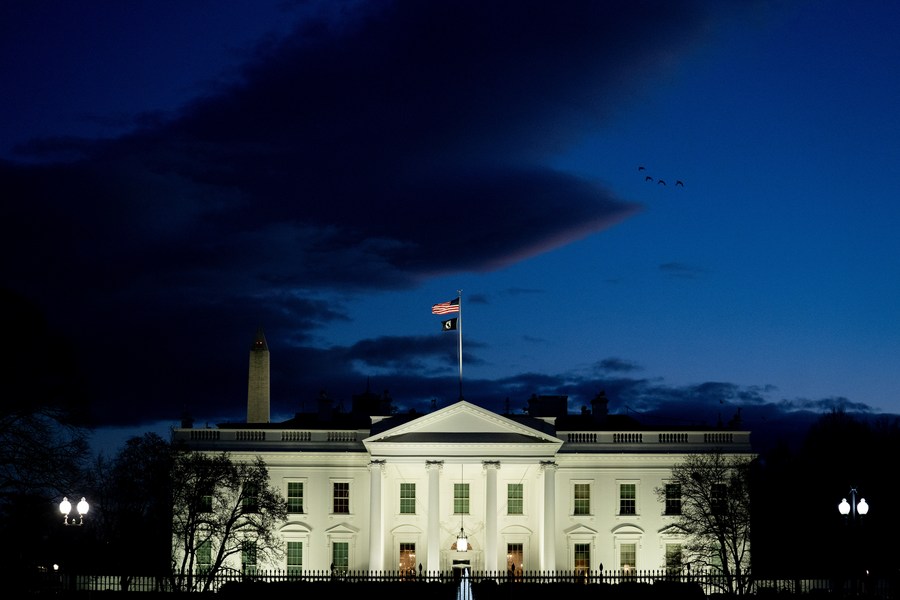U.S. debt default crisis becomes political pawn of partisan fight
NEW YORK, May 29 (Xinhua) -- After weeks of trading blame and playing a game of chicken, the U.S. White House and Republicans on Sunday reached a final agreement to raise the debt ceiling to avert a fast-approaching default amid global concerns. An economic catastrophe seems to have been avoided, but just for now.
The deal will still have to be approved by the U.S. Congress before the June 5 deadline, four days later than was previously estimated.
Even so, the brinkmanship that both parties have been accustomed to has turned the debt ceiling issue into a "time bomb" that threatens the U.S. and global economy, while the deep-rooted debt problem of the United States remains unresolved, deeply worrying the mainstream media and experts from around the world.

This photo taken on Jan. 19, 2023 shows the U.S. Capitol building in Washington, D.C., the United States. (Photo by Ting Shen/Xinhua)
A TOOL OF PARTISAN FIGHT
The debt ceiling, which is the maximum amount of debt set by the U.S. Congress for the federal government to fulfill payment obligations, has historically been a routine matter, often requiring bipartisan support to raise it. However, it has turned into a game of political football in recent decades, with lawmakers from both parties using the debt ceiling as leverage to advance their political agendas.
Despite reaching the 31.4 trillion U.S. dollar debt limit in January, discussions between the White House and Congressional leaders only began on May 9, less than a month before the estimated date of a U.S. government default on its debt obligations.
Republicans propose spending cuts in exchange for raising the borrowing limit. U.S. President Joe Biden and Democrats, meanwhile, urge Congress to pass a "clean" debt ceiling increase without conditions.
The deal reached between the White House and House Republicans offers a temporary respite, but it fails to address the deeper issue of the United States' debt default crisis becoming a tool of American political struggle.
The agreement is an important step forward and represents a compromise, said Biden in a statement after they agreed in principle to the deal on Saturday.
Republicans are poised to deliver a big, consequential change in Washington by stopping Democrats' reckless spending, taking back unspent COVID funds, and blocking Biden's new tax schemes, said U.S. House Speaker Kevin McCarthy on Saturday.
It's widely reported that the deal would suspend the debt limit until January 2025, allowing the upcoming presidential election not to be troubled by the debt ceiling issue.
However, it's still not clear if the agreement would win enough support in Congress as Republicans control the House and Democrats have an upper hand in the Senate.
The Department of the Treasury will have insufficient resources to satisfy the government's obligations if Congress has not raised or suspended the debt limit by June 5, said U.S. Treasury Secretary Janet Yellen on Friday.
"The process was tense, risky and ugly," Maya MacGuineas, president of the Committee for a Responsible Federal Budget in Washington, was quoted by the New York Times as saying.
U.S. partisan democracy has never worked perfectly, or the way it was intended, and the parties are cooperating on fewer and fewer things than in the past, given the extreme polarization, said David A. Super, professor of law and economics at Georgetown University Law Center.
"Now, any member of either party can get in a lot of trouble if they are seen cooperating with the other party on almost anything," Super told Xinhua in an interview recently.
What's more worrying is that both parties may think that if this crisis comes to pass, the other side will be hurt politically, said Wendy Edelberg, senior fellow in economic studies with the Brookings Institution.
"My guess is that those sorts of political calculations will always be with us," said Edelberg at the panel discussion.

This photo taken on Jan. 20, 2023 shows the White House in Washington, D.C., the United States. (Xinhua/Liu Jie)
UNSUSTAINABLE U.S. DEBT
For the U.S. government, hitting the legislative debt ceiling is nothing new. Yet the debt-addicted government has managed to stay under the debt ceiling for years, not by reducing its debt but by raising the ceiling.
Before the outbreak of the debt crisis this time, the U.S. debt ceiling has been modified 102 times since World War II, according to the U.S. Congressional Research Service. And since 2001 alone, there have been 20 adjustments, often accompanied by bitter political strife, market turmoil and government shutdowns.
According to data from the U.S. Treasury Department, the current federal debt of the country is about 31.46 trillion U.S. dollars, or 94,000 dollars for every American.
The debt and deficit of the United States have ballooned to unsustainable levels, topping 31 trillion and 1.4 trillion dollars, respectively, said Steven Wright, associate dean for Student Affairs and associate professor of International Relations at the College of Humanities and Social Sciences of Hamad Bin Khalifa University, Qatar.
The good news of a tentative deal for the U.S. debt ceiling impasse may quickly turn out to be bad news for financial markets, Reuters said on Sunday, explaining that once a deal is reached, the U.S. Treasury is expected to quickly refill its empty coffers with bond issuance, sucking hundreds of billions of dollars of cash from the market.
"Our concern is that if liquidity starts leaving the system, for whatever reason, this creates an environment where markets are crash prone," Alex Lennard, investment director at global asset manager Ruffer, was quoted as saying by Reuters. "That's where the debt ceiling matters."
In 2011, one of the world's leading credit rating agencies, Standard &Poor's (S&P), stripped the United States of its prized AAA credit rating for the first time ever due to the debt crisis, triggering turmoil in global financial markets. S&P has yet to restore the top rating.
Twelve years later, the credit rating agency Fitch Ratings on Wednesday announced it has placed the U.S. AAA-rated long-term foreign-currency issuer default rating on a "negative watch" as the debt ceiling deadlock continues.
"The Rating Watch Negative reflects increased political partisanship that is hindering reaching a resolution to raise or suspend the debt limit," the agency said in a statement.
"The current chaotic negotiations between Democratic President Joe Biden and the Republican majority leader in the House of Representatives show that the U.S. does not have respect and commitment to the global financial institutions that are suffering due to their unscrupulous and circus-like back-and-forth negotiations," said Joseph Matthews, a senior Cambodian professor at the BELTEI International University.

This photo taken on Jan. 20, 2023 shows the U.S. Department of the Treasury in Washington, D.C., the United States. (Xinhua/Liu Jie)
QUESTIONABLE DOLLAR HEGEMONY
The U.S. debt ceiling crisis is the result of reckless politics driven by dollar hegemony, reported the South China Morning Post, a Hong Kong-based English-language daily.
"U.S. monetary hegemony gives its politicians too much leeway to endanger national and global stability," it said.
Analysts pointed out that the root cause of the constant debt alarm in the United States is the hegemony of the dollar. While reaping huge benefits from its dollar hegemony, the United States is unable to eliminate the side effects brought by it, such as the expansion of the trade deficit and the imbalance of international payments, while the U.S. government has to deal with the pressure of credit bankruptcy, which sowed the seeds of the U.S. debt crisis.
Due to dollar hegemony, dollar assets, including U.S. Treasuries, are sought after by global traders and investors, allowing the United States to repatriate dollars at a very low cost. It also uses quantitative easing and other extraordinary monetary policies to depress the U.S. dollar exchange rate and treasury bond yields, diluting investors' rights and interests, so as to repeatedly reap the wealth of other countries.
As an international settlement currency, the U.S. dollar accounts for the majority of global trade and investment, enabling the United States to pass domestic economic problems on to other countries through export inflation and trade deficits.
This was exactly what former President Richard Nixon's Secretary of the Treasury John Connally once remarked, with self-satisfaction yet sharp precision, that the greenback "is our currency, but it is your problem."
"It is becoming harder to view the U.S. as a well-functioning, dynamic economy with a deep and sound financial system, backed up by a robust policymaking process with checks and balances," Cornell University professor Eswar Prasad was quoted by Bloomberg as saying.
The capitalist financial system does not care much about the economic effects on individuals, prioritizing instead the effects on capital and economic entities, Abdel Mohdy Motawe, a Cairo-based researcher and executive director of the Middle East Forum for Strategic Studies, told Xinhua.
From this standpoint, it is understandable why U.S. politicians continue to play brinkmanship in pursuit of positions and political gains, while neglecting the adverse consequences that befall citizens, the expert said.
Photos
Related Stories
- Pivotal data show recession already in U.S.: economist
- 3 injured, gunman killed following U.S. strip club shooting
- U.S. Texas House impeaches attorney general over corruption, lawbreaking
- Feature: U.S. embargo tramples on Cubans' human rights, trade opportunities
- White House, Republicans reach debt ceiling deal in principle
Copyright © 2023 People's Daily Online. All Rights Reserved.









